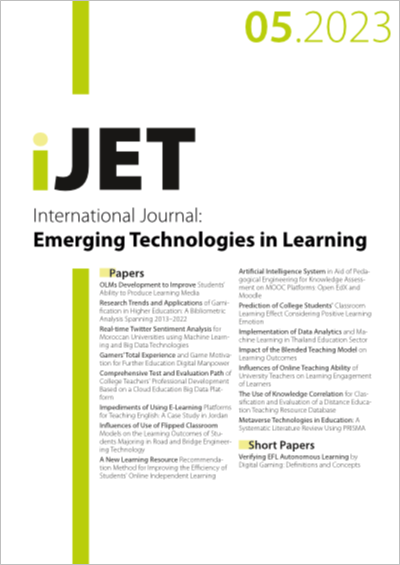Impediments of Using E-Learning Platforms for Teaching English: A Case Study in Jordan
DOI:
https://doi.org/10.3991/ijet.v18i05.36727Abstract
E-learning platforms are essential tools used widely for teaching and learning English, especially since the COVID-19 pandemic. They are also used to communicate and interact with students, assess progress, evaluate assignments, and provide feedback. However, teachers of English face potential barriers when they use such platforms. This study examines the use of e-learning platforms in teaching English as a foreign language in Jordan. The study employed a quantitative research method. The findings revealed that using e-learning platforms for educational purposes is beneficial regarding accessibility when attending courses. E-learning enabled the students to practise more and to be more engaged in the learning process, which improved their language skills. Effective e-learning platform strategies significantly broaden students' perceptions and increase the opportunity to exchange information with their classmates. Nonetheless, several impediments may hinder the application of e-learning platforms, including teacher-related, technical, and technological factors. The study recommends that teachers use interactive methods, including images, sounds, videos, and multimedia, to engage learners with various needs and abilities. The study also suggests building codified standards when designing e-learning to develop students' skills at all levels and training teachers on using modern technological strategies in e-learning.
Downloads
Published
How to Cite
Issue
Section
License
Copyright (c) 2023 Ali Alkhaldi, Dr. Nibal Malkawi, Dr. Mahmoud A. Rababah, Dr. Issam Al dalaeen, Dr. Issam M. Taamneh, Dr. Abdallah El Omari, Dr. Khalid Rabab'ah

This work is licensed under a Creative Commons Attribution 4.0 International License.



